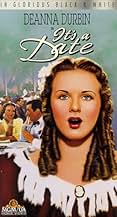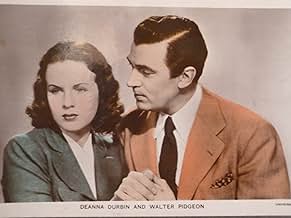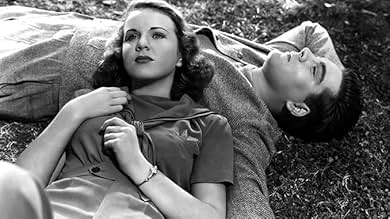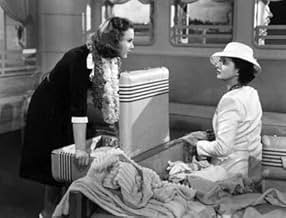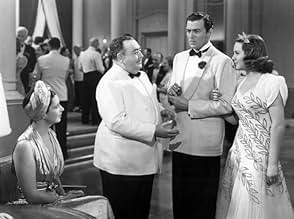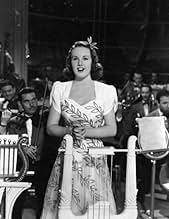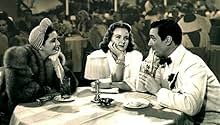अपनी भाषा में प्लॉट जोड़ेंAn aspiring actress is offered the lead in a major new play, but discovers that her mother, a more seasoned performer, expects the same part. The situation is further complicated when they b... सभी पढ़ेंAn aspiring actress is offered the lead in a major new play, but discovers that her mother, a more seasoned performer, expects the same part. The situation is further complicated when they both become involved with the same man.An aspiring actress is offered the lead in a major new play, but discovers that her mother, a more seasoned performer, expects the same part. The situation is further complicated when they both become involved with the same man.
- पुरस्कार
- कुल 4 जीत
- Ship's Steward
- (बिना क्रेडिट के)
फ़ीचर्ड समीक्षाएं
Kay Francis plays the mother (Georgia) and Deanna Durbin plays the daughter (Pamela), which makes this film eminently watchable. Walter Pidgeon is the man in the middle. At the time of filming, Francis was about 35 and Durbin was about 19, but Deanna had top billing and the meatier role. If Durbin's role had more substance, the film would have been more balanced and more interesting. As it is, the two actresses convey a warmth that compensates for a paucity of laughs.
"Cuddles" Sakall makes his Hollywood debut as the playwright for the show the women covet.
The narrative allows Durbin to display her marvelous pipes, of course. Her vocal numbers are shoehorned into the action, but they don't distract. In fact, they are one of the film's best features.
When Durbin does get a chance to sing, she's great. She puts over all of her songs with professional skill and poise, doing an absolute standout job on "Ave Maria" and "Musetta's Waltz"--but the trouble is not enough time is spent on the vocals to showcase her amazing voice. Instead, we get Kay Francis and Walter Pidgeon falling in love while Deanna dreams up all sorts of schemes to keep her mother from knowing that she has won her mother's role in a play.
Deanna looks lovely at eighteen and has probably never been photographed more beautifully but this is the sort of vehicle that has you wishing the silly plot would move on so we can hear Durbin sing once more. Walter Pidgeon and Kay Francis are adequate in support. MGM later came up with a zestier technicolored remake called "Nancy Goes To Rio" with Jane Powell.
Trivia note: This was S.Z. Sakall's first screen appearance in an American film.
The plot involves aspiring actress Deanna being offered a part that was originally promised to her stage diva mom (Kay). Then, in Hawaii, the plot shifts to a romantic triangle as the two women grapple, not for a part, but for the attentions of a pineapple tycoon, Pidgeon, who's more interested in the mother. The inherent drama in such a situation is jettisoned in favor of standard Universal Pictures sitcom antics. Kay Francis overacts but is never given any good lines, forced too often to simply react to the bubbly, aggressive Deanna.
The first section of the film offers the flavorful ambiance of a theatrical milieu, both Broadway and regional theatre, but then, after Deanna's offered the part of St. Anne, the action shifts to a cruise ship, where Deanna meets Pidgeon, and finally to Hawaii where she reunites with Mom. Once Deanna boards the ship, she leaves behind her quirky boyfriend Freddy, an aspiring actor played by the funny Lewis Howard, who then disappears from the movie. Freddy has a great bit early on where he tries to impress a casting director by acting like a 'dope fiend' which is what he thought Deanna said when she told him to try out for the part of the Dauphin. He starts going into withdrawal tics, rubbing his nose and scratching his arms, a daring bit at a time when the Production Code strictly forbade drug references.
Norman Krasna's script (from a 'story' credited to three writers) offers plenty of bright dialogue and funny bits, but the shifts in setting make it play like three movies crammed into one. William Seiter's heavy-handed direction seems more intent on showing off the lavish (for Universal) sets and less on showing off the actors, giving a bloated feel to the whole enterprise. Deanna's earlier films were leaner, zippier and bursting at the seams with youthful energy. The soundtrack is short on original songs and big on choral standards: Deanna's big numbers are 'Loch Lomond' and 'Ave Maria.'
In Durbin's earlier films, I found her speaking voice high-pitched and a little annoying and her acting overly energetic to the point of being hyper. Here, she's delightful, bubbly without being manic, and she looks very pretty. Her singing voice has matured as well - she sings "Musetta's Waltz," "Ave Maria" and "Loch Lomond." The whole voice is richer though I will never be a fan of the way sopranos in those days were trained to back off of their high notes. She puts a little too much weight in the middle voice and therefore has a somewhat screechy Bb at the end of "Quando M'en Vo." Still, however, she is one of the best classical singers in film.
Though Durbin was a huge star at Universal, the studio never bought big properties for her. This is a nice film with good performances but that's about it. Kay Francis is lovely as Georgia and Loftus is funny as Sarah. The handsome Pidgeon does his usual good job.
Deanna Durbin in the end out-Garboed Greta Garbo, retiring at the age of 27 and moving to the outskirts of France, and I don't believe she's been seen since or even interviewed. The image and voice of the young girl live, and thanks to TCM, she undoubtedly has new fans. She deserves them.
This was the seventh movie Deanna Durbin made with producer Joe Pasternak and cameraman Joseph Valentine, and the well was running dry. This drivel would give anyone with an IQ above 70 a raging headache--even in 1940. It's a trite tale of a mother (Francis) and daughter (Durbin) in love with the same man (Pigeon) as well as mother and daughter vying for the same leading role in a Broadway play. It's nonsense with neither an ounce of plausibility nor a single bit of wit, though it fancies itself a comedy. The very contrived plot is arranged to provide Durbin with a ridiculous assortment of songs: "Musetta's Waltz" from La Boheme, Schubert's "Ave Maria," "Loch Lomond," and a bland new ballad, "Love Is All." Kay Francis was looking quite fine here, though the costume designer should have been shot for giving her unflattering turban hats.
This was the first American film that S. Z. "Cuddles" Sakall appeared in, though he didn't have his nickname at that time. He was playing the sort of part here that he played throughout his Hollywood career.
And the film reminded me of what an insipid actor Walter Pigeon was.
क्या आपको पता है
- ट्रिवियाS.Z. Sakall's American film debut.
- गूफ़When John Arlen enters Pamela's room with her dress, she is fixing her hair and a hand mirror is on the vanity table close to the table mirror. But on the next cut, the hand mirror has changed position and is now partially sticking over the edge of the table.
- भाव
Karl Ober: I can't work in New York anyway. Is this place far from here?
Pamela Drake: Oh, no, Mr. Ober, it's only Maine. You know where Maine is!
Karl Ober: No.
Pamela Drake: Oh, it's practically a few minutes from here! You could write fine there.
Sidney Simpson: 'A few minutes'!
Pamela Drake: [to Sidney, blithely] Yes!
[to Ober]
Pamela Drake: That's all, really.
Karl Ober: [wagging his finger] Then it isn't quiet enough. I have to go further away from New York.
Pamela Drake: Oh, good - it *is* far away! Takes a whole day to get there.
[to Sidney, brightly]
Pamela Drake: Really, I'm an awful liar, aren't I?
Sidney Simpson: Yes.
- कनेक्शनEdited into Gems of Song (1949)
- साउंडट्रैकLove is All
(1940)
Music by Pinky Tomlin
Lyrics by Harry Tobias
Piano: Cecilia Loftus (uncredited)
Sung by Deanna Durbin (uncredited)
टॉप पसंद
विवरण
बॉक्स ऑफ़िस
- बजट
- $8,67,000(अनुमानित)
- चलने की अवधि1 घंटा 43 मिनट
- रंग
- पक्ष अनुपात
- 1.37 : 1
इस पेज में योगदान दें



